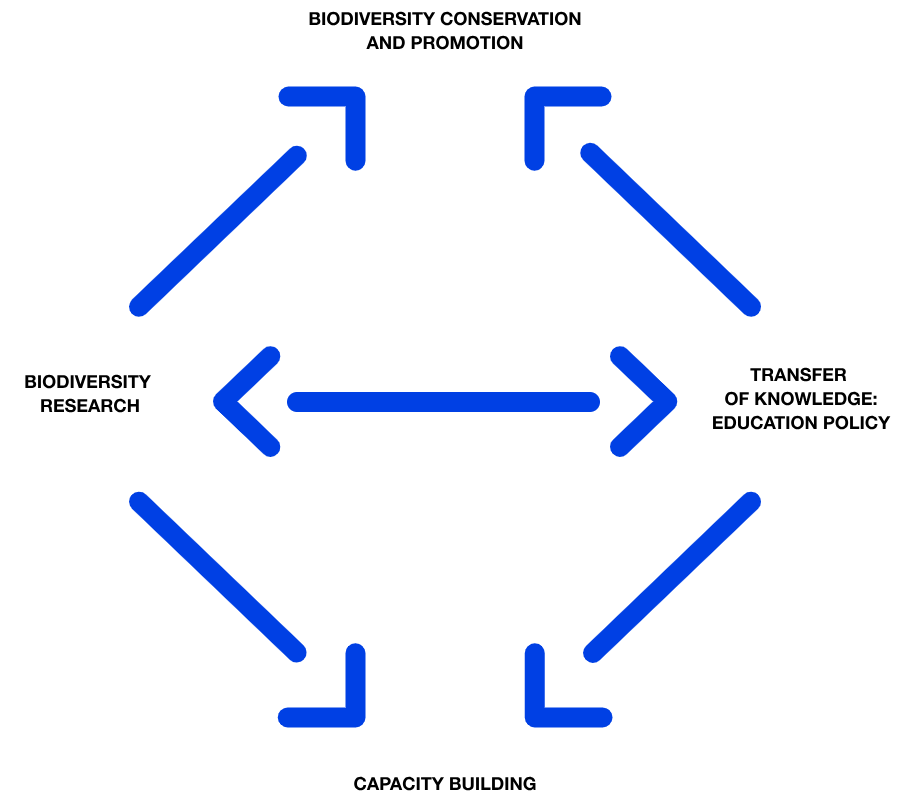
BIODICE 3 PILLARS
RESEARCH
Despite various research efforts, our knowledge of Icelandic biodiversity is fragmented, e.g. regarding taxa, ecosystem characteristics, and evolutionary processes. This lack of knowledge impedes the sustainable use of resources and biodiversity conservation. Research on Icelandic biodiversity therefore requires:
A. Comprehensive long-term monitoring of biodiversity
B. Multi-level (from genes to ecosystems) biodiversity research, incorporating biodiversity patterns and processes, and how biodiversity affects ecosystem function and services
C. Evaluation of how land use and management strategies influence biodiversity, and how they should be managed
D. Comprehensive understanding of phenotypic and genotypic variation within species, to understand the processes that create and maintain within- and between-species diversity
E. Improved open-access genomic capabilities (whole-genome sequencing, metagenomics, environmental DNA, voucher samples) to better understand past and future adaptive capacities in the face of environmental change
RESEARCH WORKING GROUP: Christophe Pampoulie (MFRI, chair) Isabel C. Barrio (Agricultural University of Iceland, AUI) Snæbjörn Pálsson (UI), Valerie Maier (UI). The role of this group is to provide research overview and lead research developments within BIODICE. The first task of this working group has been developing a collaboration with the European Molecular Biology Laboratory (EMBL) regarding their Traversing European Coastlines (TREC 2022) project. For further information please contact Chris Pampoulie (christophe.s.pampoulie@hafogvatn.is)
TRANSFER OF KNOWLEDGE EDUCATION
There is a need to develop a centralized bio-monitoring infrastructure that will educate and facilitate knowledge transfer to society. This requires:
A. Compilation of existing knowledge and data on Icelandic biodiversity at all levels.
B. Regular public communication on biodiversity issues.
C. Promotion of community science projects, workshops, and seminar series.
D. Support education in schools and community groups
E. Support and strengthen university biodiversity training programs, and support relevant job creation.
F. Organise events and discussions to promote transforming our relationship with nature.
EDUCATION WORKING GROUP: Ragnhildur Guðmundsdóttir (IMNH, chair), Rannveig Magnúsdóttir (Landvernd) Edda Elísabet Magnúsdóttir (UI). The task of this group is to lead biodiversity education within the BIODICE network. The group focuses on promoting biodiversity education at all levels. For further information contact Ragnhildur Guðmundsdóttir ragnhildur.gudmundsdottir@nmsi.is.
TRANSFER OF KNOWLEDGE POLICY
There is a need to synchronize and continuously update information on biodiversity in Iceland, and make it accessible and applicable for policy making. It requires the following actions:
A. Support and develop infrastructure for monitoring biodiversity
B. Identify knowledge gaps and support targeted research to address gaps
C. Develop a biodiversity management framework to conserve multi-level diversity, incorporating adaptive management approaches
D. Building a trusting dialogue between scientists and policymakers where findings and recommendations are clearly communicated
BIODIVERSITY POLICY WORKING GROUP: Snorri Sigurðsson (IINH, chair), Tómas Grétar Gunnarsson (UI), Bjarni Kristófer Kristjánsson (HU), Hafdís Hanna Ægisdóttir (UI), Inga Svala Jónsdóttir (UI), Ástrós Eva Ársælsdóttir (Young Environmentalists), Ragnhildur Guðmundsdóttir (IMNH) and Skúli Skúlason (HU & IMNH). The group will lead development and promotion of accurate and effective biodiversity policy. The group will work closely alongside the Ministry of the Environment, Energy and Climate to develop effective biodiversity policy. For further information contact Snorri Sigurðsson (snorri.sigurdsson@ni.is).